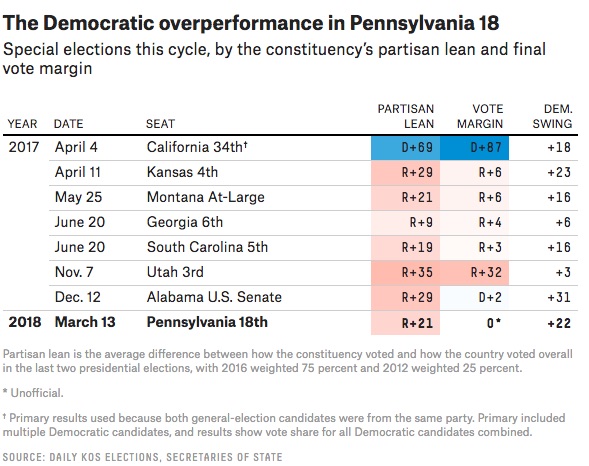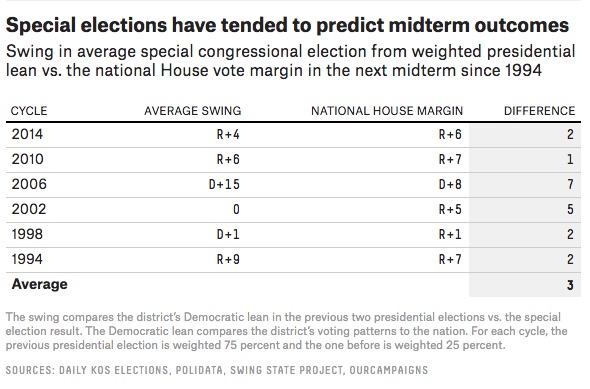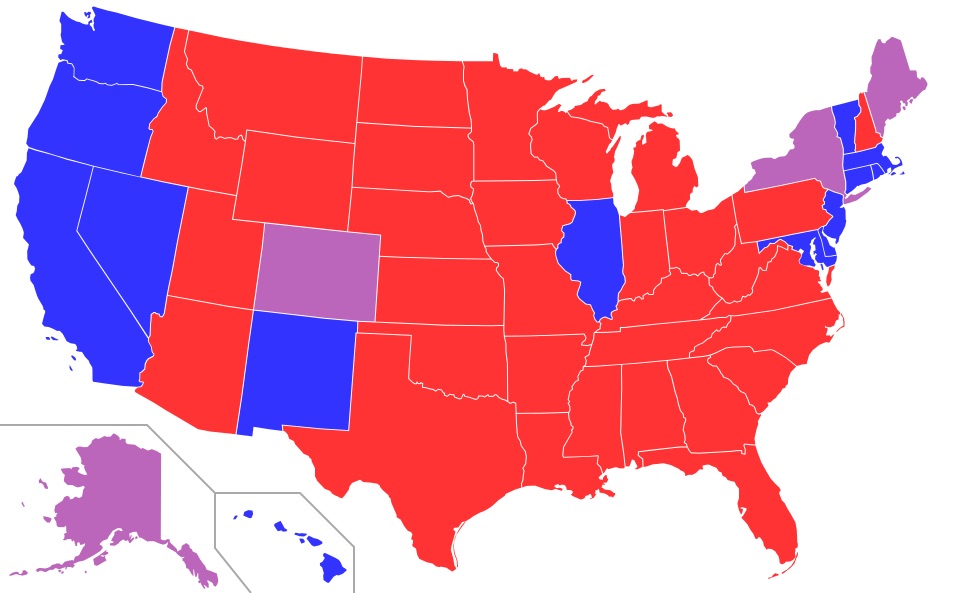Analytical thinking: Unexpected consequences of a single election
A Democrat narrowly won a special election for an open congressional seat in western Pennsylvania. It’s only one election. But as an exercise in analytical thinking, let’s figure out what it could mean.
First, the facts. Tim Murphy, the Republican in the 18th congressional district, resigned after his mistress said he’d told her to get an abortion. The Democrat Conor Lamb won the special election to fill the seat, after taking conservative stands on issues like abortion and gun control, although he’s still against the Republican tax plan and for preserving the Affordable Care Act. Lamb won by only 627 votes, or 0.3% of all the votes cast in the election, but most election analysts think his margin will stand up in a recount. However, this district voted for Trump in the 2016 election by a margin of 21%, so this was an incredible swing in the direction of the Democratic candidate. In the end, Lamb will have to run again almost immediately, and in a newly configured district, since the Pennsylvania Supreme Court has drawn new districts for the 2018 midterm election.
Given all those unique factors, this is clearly a very special special election.
But I am an analyst. What that means is that you don’t take a series of facts and just sit on them. You combine them with other facts and models of the world to figure out the meaning of changes and trends. This is what analysis is.
A deeper analysis of the special election
Most people think only of the first-order consequences of a data point. True analysts play the analysis out, looking for consequences, and consequences of those consequences, and so on. At Forrester, we called this “What it means.” At Giga, they called it “So what?” But whatever you call it, it is the difference between a shallow analysis and a deep one, and is the only way to get to surprising possible outcomes.
It can also be wrong, because the further you take out the analysis, the more assumptions you are making.
So, let’s apply this method to the Pennsylvania special election. For the purposes of analysis, which candidate won is immaterial. What matters is the 21-point shift from Republicans to a virtual tie. But this is one data point. Are there other data points? Here’s a table from fivethirtyeight.com of all the special elections since Trump was elected president:

In all cases, the electorate has shifted to the Democrat. Republicans won five of those eight elections, but by lower margins than Trump’s edge in the presidential election. Of the three races the Democrats won, one was in a heavily Democratic district, one was against Roy Moore, an accused child molester, and the third was in Pennsylvania on Tuesday.
Does the shift matter in the midterm election? Here’s another fivethirtyeight chart comparing the average swing in special elections to what happened in following midterm election.

in 1994, 2006, 2010, and 2014 there were significant swings in the special elections followed by swings in the same direction in the midterms. So there’s pretty good evidence that the special elections so far are a sign that Democrats will win many more House seats in 2014. The Democrats must gain 24 seats to gain a majority, but by one count, there are 110 Republican seats where the margin is no larger than in the Pennsylvania 18th. The pollster Rachel Bitecofer said “I’d put the probability that Democrats pick up the 24 seats they need for control of the House at almost 100 percent.”
So let’s play out the analysis:
- Democrats will attempt to compete for over 100 seats that are currently held by Republicans. The Democratic Congressional Campaign Committee has stepped up its recruiting of candidates.
- Lamb won in Pennsylvania in part because of an “enthusiasm gap” — Democratic voters are energized while some Republican voters are uneasy about Trump.
- Suburban voters turned the tide for Lamb in Pennsylvania — winning them over could make the difference in other congressional elections.
- Candidates who want to win in Republican districts, like Lamb, will take moderate positions that can win over Republican voters and others who voted for Trump.
- Democrats will increase their chances of winning if they do not enforce idealogical purity tests on issues like abortion and gun control.
- If the Democrats win the House, a set of swing-voting moderate Democrats swept into office in 2018 will hold increasing influence.
- Democrats’ ability to succeed will depend on whether their leaders can bridge the gap between liberals and this new block of moderates.
Here’s an other chain of reasoning:
- Even if Democrats win the House, they will have a much harder time winning the Senate. Of the 34 seats up for election, only eight are Republicans and 26 are Democrats. Many of the Democrats, like Claire McCaskill in Missouri, Jon Tester in Montana, and Joe Manchin in West Virginia, are in Republican states.
- Even if the Democrats secure a majority in the Senate, they will not have 60 seats, so they will be vulnerable to filibusters.
- The government will be further divided, with no party in control.
- Trump’s ability to reach across the aisle has been limited, so he is unlikely to be able to make deals with Democrats to get anything done.
- The last two years of Trump’s term will be marked by gridlock and a failure to move anything forward.
- Even if the Democrats secure a majority in the Senate, they will not have 60 seats, so they will be vulnerable to filibusters.
What does it mean for impeachment?
- A large Democratic House majority is likely to move to impeach President Trump on the basis of collusion or obstruction of justice.
- Conviction in the Senate requires 67 votes. If the Senate is narrowly balanced, any conviction would require at least 15 Republican votes.
- Senate Republicans, having seen Trump’s power to elect Republicans fade in the 2018 midterms, may calculate that they are better off with Mike Pence than with a president who is rejecting traditional Republican positions like free trade. (Not to mention, they may actually be sick of president who has trouble staying on message, turns on them at any moment, and can’t keep a cabinet in place. Or they may actually take into account the charges that Trump is accused of.)
- Regardless of whether Trump is removed or not, the country will be riven during the impeachment in the House and trial in the Senate.
- Trump will use Twitter, may incite violence, and may refuse to abide by the terms of the impeachment.
- Impeachment may be on the table for every subsequent election, given the bad blood created during the impeachment process.
- Trump voters frustrated by the process will be highly vocal in the 2020 presidential election, regardless of who is running.
- Conviction in the Senate requires 67 votes. If the Senate is narrowly balanced, any conviction would require at least 15 Republican votes.
Finally, what does it mean for the long-term future of the parties?
- A Democratic shift in 2018 and 2020, driven by a backlash against Trump, could change the party balance at in state legislatures as well.
- Republicans have gained over 1000 seats in state legislatures since 2010. They control 32 of 50 state legislatures; 4 have split control. In states like Virginia, Pennsylvania, New Hampshire, New York, Colorado, Florida, and Ohio, a Democratic shift could return control of the state legislatures to the Democrats. This is important, because state legislatures draw the boundaries for U.S. Congressional districts, and redistricting begins after the 2020 census.
- State legislatures may undo or reverse the gerrymandering that has contributed to Republican control of the U.S. House of Representatives. Because of the way districts are drawn, and because Democratic voters tend to cluster in cities, Republicans have an advantage in Congressional elections where the parties are close.
- Court-mandated redistricting (as in Pennsylvania) might also give the Democrats an advantage in redistricting.
- In contrast to candidate-driven shifts, redistricting-driven shifts can last for decades. Combined with the aging of the population and increasing numbers of minority voters, this could contribute to a long-term advantage for Democrats.
- Republicans have gained over 1000 seats in state legislatures since 2010. They control 32 of 50 state legislatures; 4 have split control. In states like Virginia, Pennsylvania, New Hampshire, New York, Colorado, Florida, and Ohio, a Democratic shift could return control of the state legislatures to the Democrats. This is important, because state legislatures draw the boundaries for U.S. Congressional districts, and redistricting begins after the 2020 census.

Before I leave this analysis . . .everything I’ve written is favorable to Democrats. A good analyst become suspicious when all the reasoning favors one side, because it is often evidence of bias. So what trends might favor Republicans?
- If the economy continues to do well and Trump’s tariffs actually help bolster American business, voters may come around to his point view. This could reverse even a historic Democratic shift in the midterm elections.
- Trump’s major Republican critics — voices like Jeff Flake and Bob Corker — are leaving the Senate. This may weaken Republican opposition to Trump. (On the other hand, vocal Trump critic Mitt Romney is likely to replace Orrin Hatch in Utah.)
- If Trump resigns or is impeached and convicted, Mike Pence, a more conventional Republican politician, could consolidate Republican positions and, if the Democrats fail to take over the House, actually capitalize on a united government controlled by Republicans. This could put him and his party in a position to make gains in the 2020 election cycle.
- Russians or other foreign actors could continue to weaponize Facebook and Twitter or actually penetrate systems that maintain voter rolls or final voting tallies, throwing the election to who-knows-whom, and upsetting all confidence in the election results.
- If Democrats in the House fail to unite and are subject to infighting between the liberal and moderate wings of the party, voters may become impatient with them. Moderate voters might vote in a Republican president in 2020 — or reelect Trump — as a counterbalance to the more extreme parts of the Democratic party.
Of course unexpected events — say, the flooding of New York City or Los Angeles in a major storm, a mass shooting in the House Chamber, or a sudden surge of rationality and truthfulness on the part of President Trump — could shift these predictions yet again. But these events are unlikely, so let’s leave the analysis where it is.
In other words, nobody really knows. 🙂